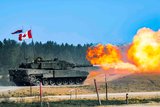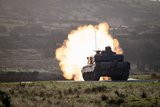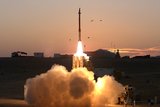Latvia enters talks to buy GDELS ASCOD IFV
ASCOD has already entered service with the Philippines Army. (Photo: GDELS)
Latvia has entered negotiations with General Dynamics European Land Systems (GDELS) Santa Bárbara Sistemas for the purchase of Austrian Spanish Cooperative Development (ASCOD) tracked combat vehicles.
The ASCOD is already in use with the armed forces of Spain, Austria, the UK, the US and the Philippines, with 1,200 units in service or under contract worldwide.
Latvian defence minister Andris Sprūds said: “Experts from the Ministry of Defence and the Armed Forces have conducted a thorough analysis to select the combat vehicles that are most suitable for our needs.”
Negotiations are expected to be concluded in the next six months and could be worth up to €250 million (US$265 million) with the order likely to be for more than 100 vehicles.
The platform will be a new capability for Latvia which currently operates a limited number of tracked vehicles with the fleet substantially made up of smaller Combat Vehicle Reconnaissance (Tracked) (CVR(T)).
Latvia has invested heavily in vehicles, including this week for additional Common Armoured Vehicle System 6x6 vehicles, and in December last year signed a €600 million deal with Diehl Defence for an IRIS-T SLM medium-range air defence system.
Related Equipment in Defence Insight
More from Land Warfare
-
![US DoD task force’s DroneHunter acquisition lays groundwork for Replicator 2 CUAS strategy]()
US DoD task force’s DroneHunter acquisition lays groundwork for Replicator 2 CUAS strategy
As the US Department of Defense looks to counter the growing threat of uncrewed aerial systems to improve homeland security, the DroneHunter acquisition could point to future commercial innovation.
-
![Norway opts for Hanwha’s Chunmoo for long-range fires under $2 billion deal]()
Norway opts for Hanwha’s Chunmoo for long-range fires under $2 billion deal
The selection of Hanwha’s K239 Chunmoo long-range precision fires system, with a contract expected to be signed on 30 January, makes Norway the second European country to choose the system. It is expected an operational system will be in service within four years.
-
![Layered protection: How air defence is adapting to rising drone and missile threats (podcast)]()
Layered protection: How air defence is adapting to rising drone and missile threats (podcast)
A surge in aerial threats – from advanced missiles to low-cost drones – is reshaping the way militaries approach air defence, driving demand for flexible, multi-layered solutions.






















